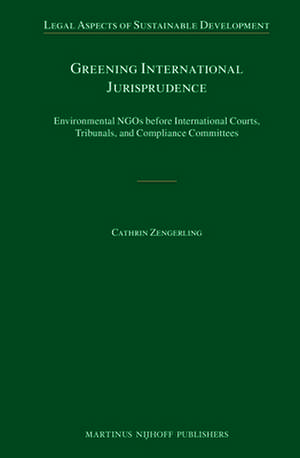Greening International Jurisprudence: Environmental NGOs before International Courts, Tribunals, and Compliance Committees: Legal Aspects of Sustainable Development, cartea 17
Autor Cathrin Zengerlingen Limba Engleză Hardback – 21 aug 2013
The analytical structure of the study is based on four aspects of discussion and research: the enforcement deficit in environmental law; global environmental governance and sustainable development; the proliferation of international judicial and quasi-judicial bodies; and deliberation and democratic global governance. Author Cathrin Zengerling analyses the institutional structure, as well as the environmental case law from a total of fourteen international courts, arbitral tribunals, and compliance committees with special focus on accessibility, comprehensiveness, and transparency. Underlying this analysis is the fundamental question of whether the respective body appropriately contributes to the realization of democratic governance for sustainable development. After presenting her core findings, the author provides concrete recommendations for future best practices and discusses the need for a new World Environment Court.
Researchers, practitioners, and students of international environmental law will find an important, thought-provoking and timely new text in Greening International Jurisprudence: Environmental NGOs before International Courts, Tribunals, and Compliance Committees.
Din seria Legal Aspects of Sustainable Development
- 18%
 Preț: 781.67 lei
Preț: 781.67 lei - 18%
 Preț: 993.63 lei
Preț: 993.63 lei - 18%
 Preț: 729.71 lei
Preț: 729.71 lei - 18%
 Preț: 903.63 lei
Preț: 903.63 lei - 18%
 Preț: 1085.84 lei
Preț: 1085.84 lei - 18%
 Preț: 630.45 lei
Preț: 630.45 lei - 18%
 Preț: 832.48 lei
Preț: 832.48 lei - 18%
 Preț: 917.69 lei
Preț: 917.69 lei - 18%
 Preț: 857.20 lei
Preț: 857.20 lei - 18%
 Preț: 938.64 lei
Preț: 938.64 lei - 18%
 Preț: 765.21 lei
Preț: 765.21 lei - 18%
 Preț: 760.15 lei
Preț: 760.15 lei - 18%
 Preț: 725.94 lei
Preț: 725.94 lei - 18%
 Preț: 767.81 lei
Preț: 767.81 lei - 18%
 Preț: 832.90 lei
Preț: 832.90 lei - 18%
 Preț: 722.15 lei
Preț: 722.15 lei - 18%
 Preț: 742.33 lei
Preț: 742.33 lei - 18%
 Preț: 743.49 lei
Preț: 743.49 lei - 18%
 Preț: 889.69 lei
Preț: 889.69 lei - 18%
 Preț: 908.60 lei
Preț: 908.60 lei - 18%
 Preț: 865.53 lei
Preț: 865.53 lei
Preț: 961.51 lei
Preț vechi: 1172.57 lei
-18% Nou
Puncte Express: 1442
Preț estimativ în valută:
183.98€ • 192.11$ • 151.93£
183.98€ • 192.11$ • 151.93£
Carte indisponibilă temporar
Doresc să fiu notificat când acest titlu va fi disponibil:
Se trimite...
Preluare comenzi: 021 569.72.76
Specificații
ISBN-13: 9789004257306
ISBN-10: 9004257306
Pagini: 374
Dimensiuni: 155 x 235 mm
Greutate: 0 kg
Ediția:XXX, 374 Pp.
Editura: Brill
Colecția Brill | Nijhoff
Seria Legal Aspects of Sustainable Development
ISBN-10: 9004257306
Pagini: 374
Dimensiuni: 155 x 235 mm
Greutate: 0 kg
Ediția:XXX, 374 Pp.
Editura: Brill
Colecția Brill | Nijhoff
Seria Legal Aspects of Sustainable Development
Notă biografică
Dr. Cathrin Zengerling, LL.M. (University of Michigan) is an environmental lawyer specializing in (international) environmental law and energy law. She works as an attorney at the law firm Rechtsanwälte Günther in Hamburg and as a lecturer on the Master’s Program REAP (Resource Efficiency in Architecture and Planning) at the HafenCity University Hamburg, Germany. Her main research interests are in the field of (international) environmental and energy law with a focus on public participation and the intersection of environmental protection and development.
Cuprins
Series Editor's Preface
Acknowledgments
List of Abbreviations
Table of International Instruments
Introduction
I. Enforcement Deficit of Environmental Law
II. Global Environmental Governance and Sustainable Development
III. Proliferation of International Judicial and Quasi-Judicial Institutions
IV. Deliberation and Democratic Global Governance
V. Structure of the Analysis
Chapter 1: ENGOs, Environmental Problems, International Law and Politics
I. ENGOs and Environmental Problems
II. ENGOs in International Political Commitments
III. Relevance, Definition and Legal Status of NGOs in International Law
IV. Legitimacy and Accountability
V. Conclusions
Chapter 2: Multilevel Enforcement of International Environmental Law
I. International Environmental Law
II. National Courts – Germany and the United States
III. European Court of Justice
IV. International Courts, Arbitral Tribunals, and Compliance Committees
V. Conclusions
Chapter 3: Regional International Judicial and Quasi-Judicial Bodies
I. Judicial Dispute Settlement – Regional Human Rights Courts
II. Arbitration
III. Compliance Committee of the Aarhus Convention
IV. Other Compliance Review Bodies
V. Conclusions
Chapter 4: Universal International Judicial and Quasi-Judicial Bodies
I. Judicial Dispute Settlement
II. Arbitration
III. Compliance Committee of the Kyoto Protocol
IV. A New World Environment Court
V. Conclusions
Chapter 5: Conclusions and Theses
I. Environmental NGOs as High Potentials
II. Need for Clear Political Commitment
III. No Legal Constraints
IV. International Environmental Law is Justiciable
V. Further Regionalize or Globalize Aarhus
VI. Gaps in National Judicial Review
VII. Constraints and Opportunities of the ECJ
VIII. Cases for the International Level
IX. Differentiated View on International Law Enforcement Procedures
X. Regional vs. Universal
XI. More Communication to Further Coherence of International Legal Order
XII. Human Rights Courts and Environmental Protection
XIII. NGOs vs. Private Companies under the OECD Guidelines
XIV. Deficits of Universal International Judicial Dispute Settlement Bodies
XV. ICJ – Limited Chances and Missed Opportunities
XVI. WTO – The In-Built Bias, Lack of Transparency and Access
XVII. ITLOS – Prompt Release of IUU Fishing Fleets and Lack of Access
XVIII. Limit the Influence of International Arbitral Tribunals
XIX. Strengthen Compliance Committees under MEAs
XX. A New World Environment Court
Appendix – Synthesis Chart
List of Literature
